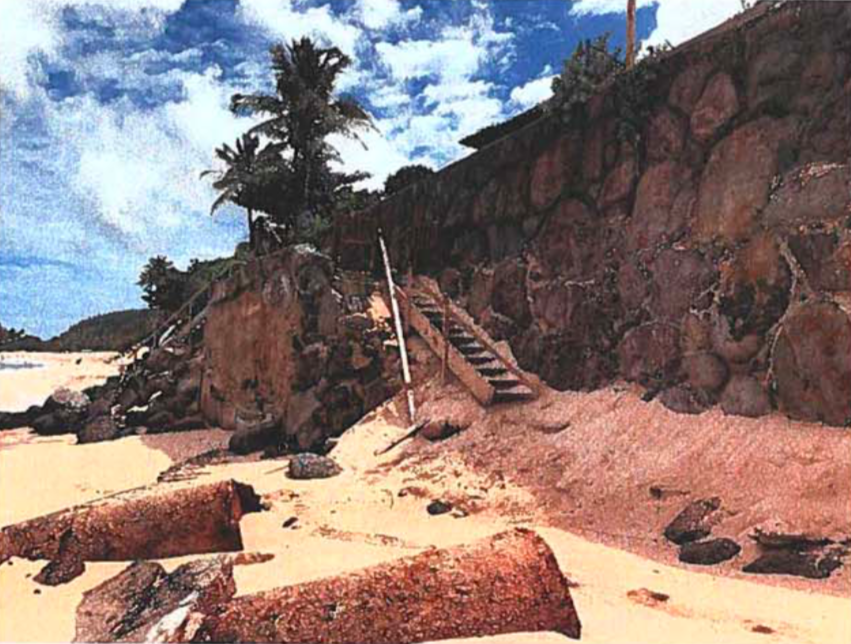Sunset Seawall Court Case: On February 10, 1st Circuit Judge Jeffrey Crabtree will hear arguments on the state’s January 12 motion to compel Sunset Beach homeowners James and Denise O’Shea to produce documents supporting their claims that the state holds some of the blame for their unauthorized 2017 construction of a boulder and concrete seawall on the public beach.
That year, the Board of Land and Natural Resources proposed fining the couple $75,000 for the work, which they initiated after the seawall fronting their home and that of their neighbors fell apart, and which continued for five days after the state ordered them to stop. The matter was deferred after they requested a contested case hearing.
The dispute, now in Circuit Court, has since drawn in that Ke Nui Road neighbor, Rupert Oberlohr. The O’Sheas claim that modifications Oberlohr made to the original seawall caused it to move and ultimately collapse. They also claim that the wall was built in the 1950s “by or for the state of Hawaiʻi, on state property,” and that the state’s failure to maintain the wall “and/or the state’s negligent or intentional acts or omissions directly or proximately caused the collapse.”
The O’Sheas, in a September 2018 counterclaim, attempted to “foist blame upon the state,” as state deputy attorneys general put it. So on October and again in December of last year, the state asked the O’Sheas to produce documents (maps, plans, photos, and correspondence, etc.) regarding the old seawall, including those relating to its construction, repair, maintenance, condition, or location.
On December 18, the O’Sheas’ attorneys filed a response with the court explaining why they objected to the state’s requests. Among other things, they argued it wasn’t the O’Sheas’ obligation to meet the state’s over-broad, vague, burdensome, and expensive request. What’s more, some of those documents might, for various reasons, be confidential, they argued.
East Maui Permit Case: When met with a request for a contested case hearing, the state Board of Land and Natural Resources often pauses its regular meeting, holds an executive session, and upon its return immediately and without explanation votes to deny the request.
Instead of seeking a court order forcing the board to hold a contested case hearing, the Sierra Club, in the case regarding the 2018 and 2019 revocable permits for the diversion of East Maui streams by Alexander & Baldwin and East Maui Irrigation Company, chose to ask the court itself to decide on whether those permits were properly approved.
With regard to the companies’ permits approved by the board last year, however, the Sierra Club is pressing the court to force the Land Board to hold a contested case.
Ittook more than 19 months for the Sierra Club’s lawsuit over the Land Board’s 2018 decision to go to trial, the Sierra Club’s attorney, David Kimo Frankel, noted in his opening brief last month. “The trial itself lasted more than two weeks. And more than two years after the Sierra Club filed that complaint, no decision had been reached. In the meantime, A&B has been allowed to continue diverting streams and draining them dry pursuant to both the 2018 and 2019 BLNR decisions. A&B continued to take all the baseflow most of the time from 13 streams and waste most of that water. … Given this court’s calendar and COVID, it is completely unrealistic to expect that a trial on the merits of BLNR’s decision could be held—and a decision rendered—by the end of 2021. Moreover, it is inappropriate to burden this court with a task that BLNR should be fulfilling,” he wrote.
He cited the Hawaiʻi Supreme Court’s decisions in cases involving the Maui electric utility that found that the Public Utilities Commission violated the Sierra Club’s due process rights to a clean and healthful environment by approving a power purchase agreement without holding a contested case hearing on environmental impacts.
He argued that the Land Board violated the Sierra Club’s due process rights when it authorized the continued diversion of East Maui streams without holding the requested contested case hearing.
He added that there is “a plethora of evidence that the August 2020 trial did not consider,” including the state Division of Aquatic Resources’ determination that four of the streams the Sierra Club is seeking protection for “should be a high priority for stream restoration.”
Quote of the Month
“It is an era where oceanfront property is no longer a benefit, but a major liability.”
— Sam Gon, Land Board


Leave a Reply